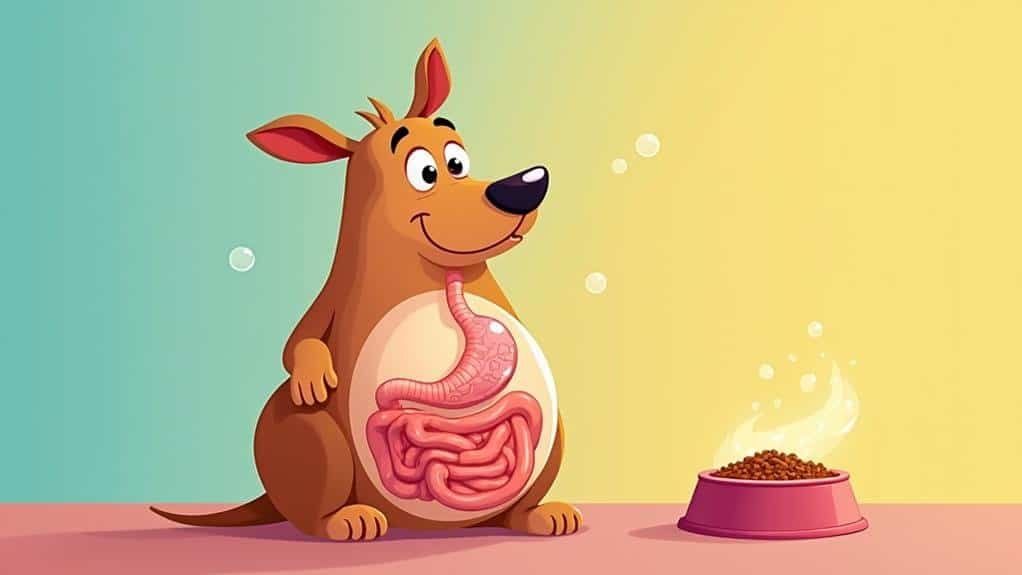Your dog's excessive burping can be caused by various factors. Common reasons include swallowing air while eating too quickly, dietary issues like high-fat foods or food intolerances, and certain medical conditions such as GERD or IBD. Behavioral influences, like anxiety, can also lead to increased burping. While occasional burping is normal, frequent or sudden changes in burping patterns, especially when accompanied by other symptoms like vomiting or lethargy, may indicate a health concern. You can manage your dog's burping through feeding techniques and diet adjustments, but persistent issues warrant a veterinary consultation. Understanding the underlying causes can help you better care for your furry friend.
Normal Dog Burping

Just like humans, dogs occasionally burp to release excess air from their stomachs. This normal burping behavior is particularly common after meals or drinking, especially in breeds prone to eating quickly or gulping air, such as Labradors and brachycephalic dogs.
When your dog burps, you might hear sounds like "brap" or "urp," which are typically harmless. Occasional burps are usually nothing to worry about and are simply a way for your dog to expel gas in the stomach.
The frequency of these burps can vary based on your dog's individual digestive health and eating habits. However, it's crucial to keep monitoring your dog's burping patterns, as sudden changes could indicate underlying gastrointestinal issues.
While normal burping is generally not a cause for concern, it's important to pay attention to any accompanying symptoms. If your dog's burps become more frequent, are accompanied by foul odors, or occur alongside other signs like vomiting or lethargy, it may be time to consult your veterinarian.
Causes of Excessive Burping
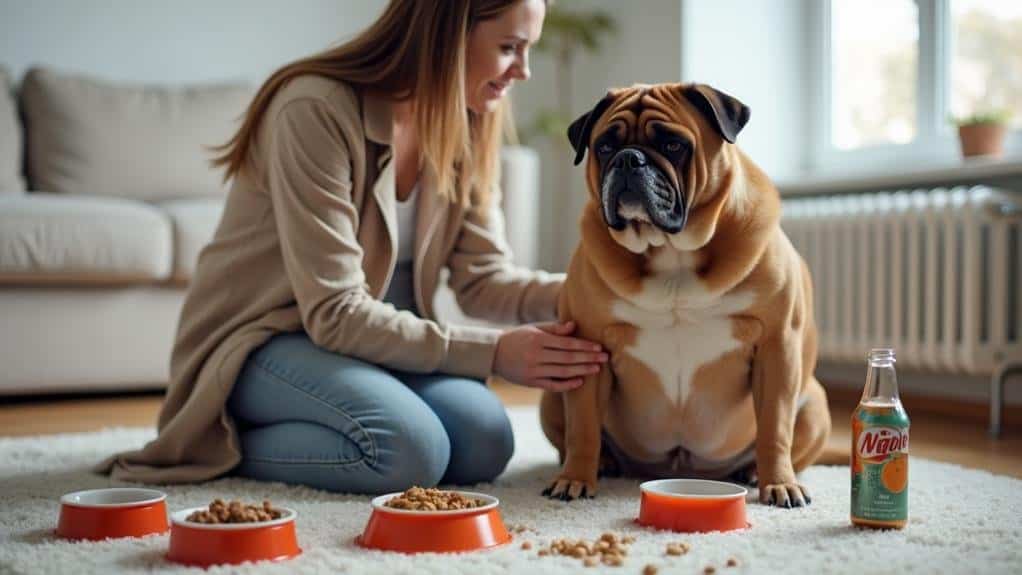
While occasional burping is normal for dogs, excessive burping can signal underlying issues that warrant attention. One common cause of excessive burping in dogs is aerophagia, which occurs when dogs swallow air during rapid eating or drinking. This is particularly prevalent in greedy eaters and brachycephalic breeds with flat faces.
Dietary factors also play a significant role. High-fat or starchy foods can increase gas production in your dog's gastrointestinal tract, leading to more frequent burping. Additionally, food intolerances or allergies may trigger gastrointestinal upset, causing your dog to burp excessively as their body reacts to certain ingredients.
More serious gastrointestinal issues, such as gastric dilatation-volvulus (GDV), gastroesophageal reflux, or inflammatory bowel disease, can manifest as excessive burping. These conditions require prompt veterinary assessment to guarantee your dog's health and well-being.
Behavioral factors shouldn't be overlooked. Anxiety and stress can cause dogs to gulp air, resulting in increased burping episodes. This is especially common in nervous or fearful dogs.
If you notice your dog burping excessively, it's crucial to take into account these potential causes and consult with your veterinarian for proper diagnosis and treatment.
Dietary Factors and Burping
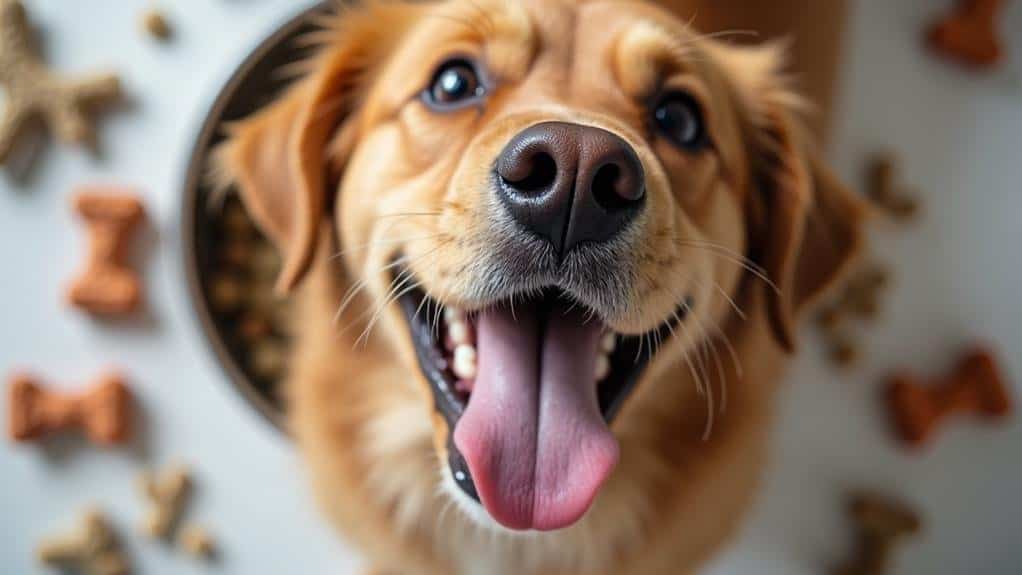
Many dietary factors can influence your dog's burping frequency. High-fat foods and processed kibble are common culprits that contribute to increased gas production, leading to frequent burping.
If you've recently changed your dog's diet, the rapid introduction of new foods can upset their digestive system, potentially causing excessive burping as their body struggles to adjust.
Some ingredients are more difficult to digest than others. Foods containing soy or certain grains can lead to increased fermentation in your dog's gut, resulting in more gas and burping.
Similarly, diets low in digestible fibers and high in fermentable carbohydrates can exacerbate gas production. To minimize these issues, opt for high-quality, low-residue dog foods that are easier on your pet's digestive system.
It's essential to monitor food ingredients and avoid known allergens to reduce gastrointestinal upset and excessive burping.
If you suspect your dog has food allergies, consult with your veterinarian to identify problematic ingredients and develop an appropriate diet plan.
Medical Conditions Behind Burping

Excessive burping in your dog can sometimes signal underlying medical conditions that require attention. One such condition is gastroesophageal reflux disease (GERD), which can cause regurgitation and discomfort if left untreated.
It's important to be aware of more serious issues like gastric dilatation-volvulus (GDV), characterized by a distended abdomen and frequent burping. GDV demands immediate veterinary care to prevent fatal complications.
Inflammatory bowel disease (IBD) is another gastrointestinal condition that can disrupt normal digestion, leading to excessive gas production and increased burping.
Similarly, pancreatitis, caused by inflammation of the pancreas, may contribute to excessive burping due to its effect on digestion and gas formation.
Don't overlook the possibility of parasitic infections, such as Giardia, which can alter your dog's gut microbiota and lead to increased gas production. These infections often result in more frequent burping and other gastrointestinal symptoms.
If you notice your dog burping excessively or showing signs of discomfort, it's important to consult your veterinarian. They can perform the necessary tests to identify any underlying medical conditions and provide appropriate treatment to alleviate your dog's symptoms and improve their overall health.
Behavioral Influences on Burping
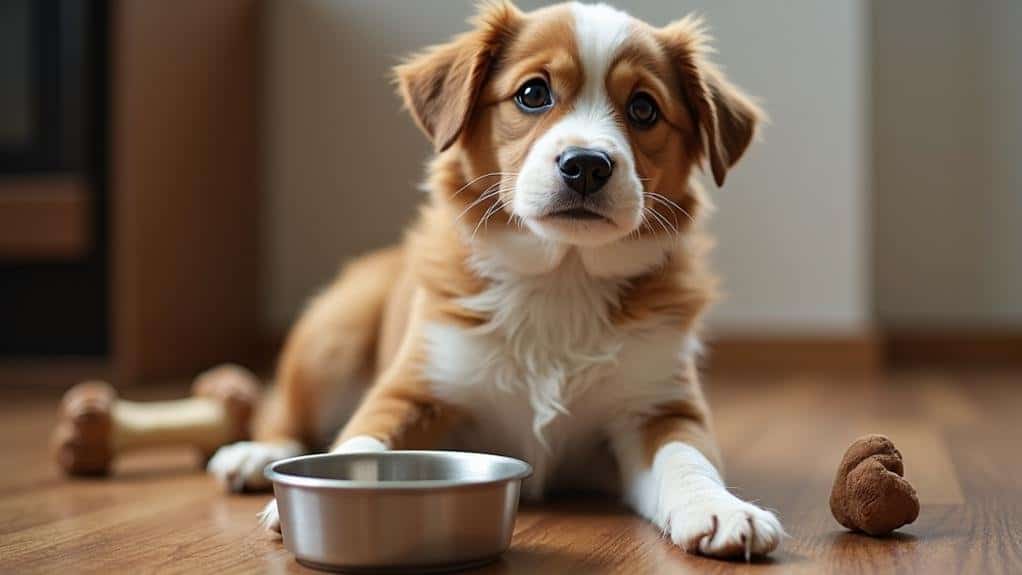
Behavioral factors play a significant role in your dog's burping frequency. One common cause is anxiety, which can lead to aerophagia, or excessive air swallowing. Nervous or fearful dogs may gulp air, resulting in more frequent burping.
Another major contributor is fast eating, a behavior often seen in breeds like Labradors or in hungry dogs generally. When your dog eats rapidly, they're more likely to swallow air along with their food, leading to increased burping.
Certain breeds, particularly brachycephalic dogs like Pugs and Bulldogs, are more prone to excessive burping due to their facial structure. Their anatomy makes them more susceptible to swallowing air while eating or drinking.
To address these behavioral influences, you can implement slow feeding techniques. Using specialized bowls or puzzle feeders can help reduce the amount of air your dog ingests during meals. Additionally, creating a calm eating environment can alleviate anxiety-related symptoms and discourage fast eating.
Warning Signs to Watch For
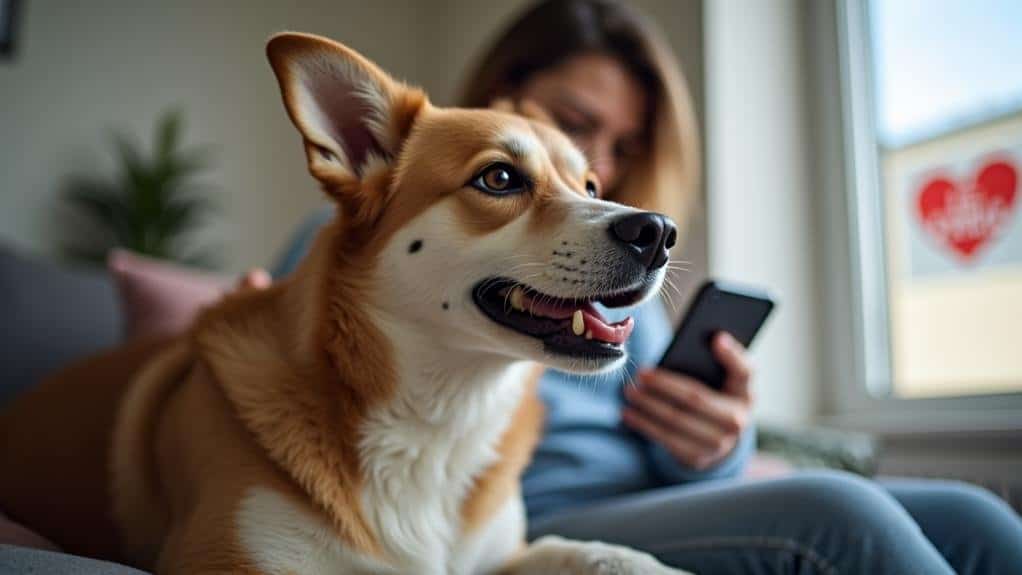
While addressing behavioral factors can help reduce your dog's burping, it's important to recognize when excessive burping might indicate a more serious issue.
If you notice your dog burping excessively outside of mealtimes, it could be a sign of gastrointestinal distress that warrants further investigation.
Pay close attention to sudden changes in your dog's burping frequency or pattern, especially if accompanied by symptoms like vomiting or lethargy.
These changes should prompt a visit to the veterinarian. Foul-smelling burps can indicate digestive problems or infections, particularly if they persist or correlate with other gastrointestinal symptoms.
Be vigilant for signs of bloat, a life-threatening condition that requires immediate veterinary attention.
Watch for a distended abdomen and unproductive burping attempts.
Monitor your dog's overall behavior and appetite alongside their burping habits, as these can provide valuable insights into potential health issues.
Managing Your Dog's Burping

Pet owners can take several practical steps to manage their dog's burping. One effective method is using slow feeder bowls to prevent rapid eating, which often leads to air swallowing and increased gas production. This simple change can greatly reduce the frequency of burping in your furry friend.
Regular exercise is another important factor in managing your dog's digestive health. By promoting gastrointestinal motility, exercise can help reduce instances of burping.
Additionally, maintaining a consistent feeding schedule can stabilize your dog's digestive system and minimize stress-related burping.
It's vital to monitor your dog's diet for potential allergens or intolerances that may contribute to excessive gas and burping. If you're switching to a new food, always implement a gradual diet change to avoid digestive upset.
Pay attention to ingredients that seem to trigger more burping and consult with your veterinarian about suitable alternatives.
Lastly, don't underestimate the importance of routine vet check-ups. These appointments are essential for identifying any underlying health issues that may be causing excessive burping.
Your veterinarian can provide tailored advice and guarantee timely intervention if necessary, helping you maintain your dog's overall well-being.
When to Consult a Veterinarian

Although managing your dog's burping at home is often effective, certain situations call for professional medical attention. If you notice your dog experiencing excessive burping alongside vomiting, it could indicate serious gastrointestinal issues or bloat, requiring immediate veterinary care.
Sudden changes in burping patterns, such as increased frequency or foul odor, may signal underlying health problems that warrant a consultation with a veterinarian.
Be vigilant for accompanying symptoms like lethargy, diarrhea, or abdominal pain, as these are red flags that necessitate a veterinary evaluation for potential gastrointestinal disorders.
If your dog's persistent burping lasts more than a few days despite dietary adjustments and slow feeding practices, it's advisable to seek professional help to rule out any serious problems.
Remember, regular veterinary check-ups are essential, especially for dogs with a history of digestive health issues. These visits allow your vet to monitor your dog's gastrointestinal health and address concerns related to burping and gas production.
Consider consulting a veterinarian when:
- Excessive burping is accompanied by vomiting or bloat
- There are sudden changes in burping patterns or odor
- Your dog exhibits accompanying symptoms like lethargy or diarrhea
- Persistent burping continues despite home remedies and dietary changes
Frequently Asked Questions
Should I Be Concerned That My Dog Burps a Lot?
You shouldn't worry about occasional burping, but if it's excessive or accompanied by other symptoms, it's cause for concern. Monitor your dog's burping patterns and consult a vet if you notice persistent changes or additional signs of discomfort.
What Can I Give My Dog That Burps a Lot?
You can give your dog a high-quality, low-fat diet and probiotics to improve digestion. Use slow feeder bowls to reduce air swallowing. Make certain they're well-hydrated and consult your vet for tailored supplements or dietary adjustments if excessive burping persists.
What Does It Mean When a Dog Burp Smells Like Poop?
If your dog's burps smell like poop, it could indicate gastrointestinal issues. You should watch for other symptoms and consider their diet. It's best to consult your vet, as it might signal underlying health problems requiring attention.
What Are the Symptoms of Aerophagia in Dogs?
You'll notice your dog burping frequently, often with loud sounds. They may have a bloated belly, show discomfort, pace, whine, or avoid lying down. You might also see them eating or drinking rapidly, which can worsen the issue.
Conclusion
You've now learned the common causes of your dog's burping and when it might be a concern. Remember, occasional burping is normal, but excessive burping could signal dietary issues or health problems. Keep an eye on your pup's eating habits and overall behavior. If you're worried about your dog's burping frequency or notice any alarming symptoms, don't hesitate to consult your vet. With proper care and attention, you'll help keep your furry friend happy and healthy.

